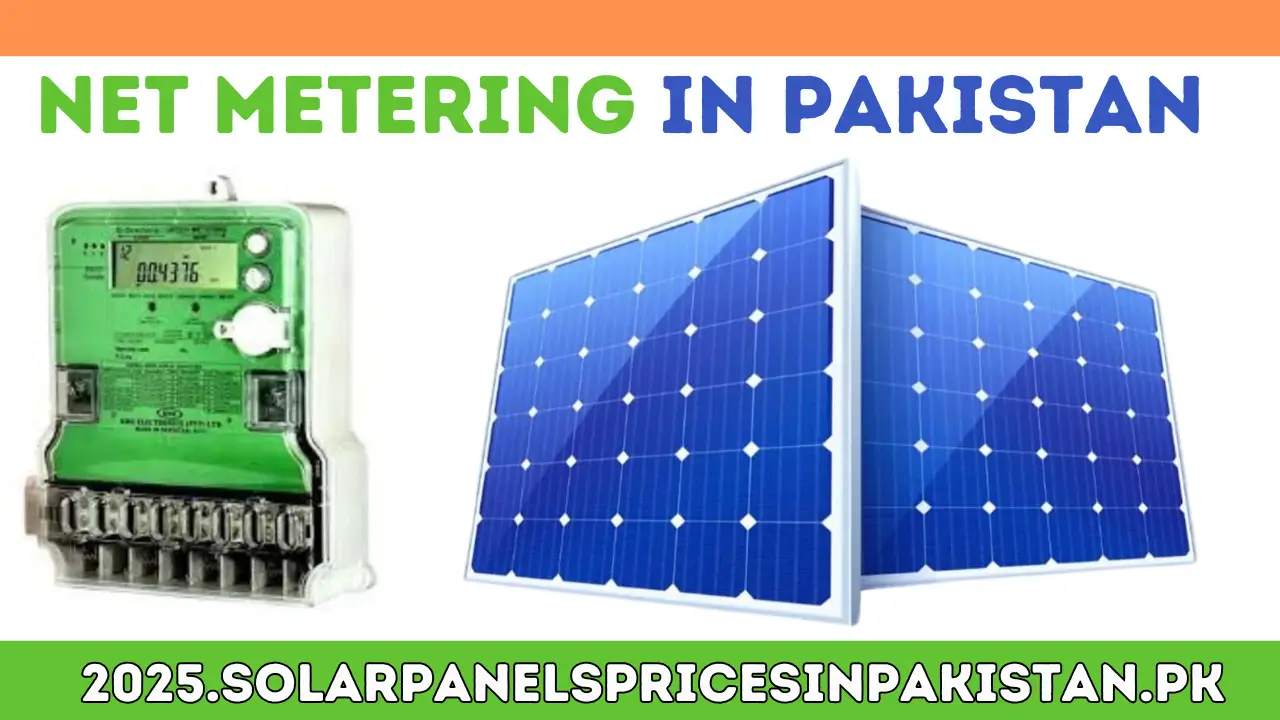Net Metering Information in Pakistan 2025
Net Metering
The energy crisis in Pakistan has been a major problem for the people for a long time. Power load shedding, high bills, and limited energy resources have forced people to look for alternative sources.
In such a situation, Net Metering has emerged as a ray of hope. This system not only provides affordable electricity to the consumers but also makes them an independent energy producer.
You Can Also Read: LG Solar Panels Price in Pakistan 2025
What is Net Metering?
Net metering is a method by which domestic or commercial consumers can generate excess electricity through their solar panels and sell it to the national grid. In return, they receive a credit from WAPDA or the relevant electricity company, which results in a reduction in their electricity bills.
Thus, if electricity consumption is low and production is high in a given month, the excess electricity goes to the national grid, and the consumer benefits financially.
Current Status of Net Metering in Pakistan
The Government of Pakistan has taken various steps to promote net metering. NEPRA introduced net metering rules in 2015, allowing consumers to install solar systems ranging from 1 to 1,000 kW and sell excess electricity.
Thousands of consumers are now benefiting from the system, and the installation of solar panels in private and public buildings is increasing. However, there are still several challenges that hinder the promotion of net metering.
Benefits of Net Metering
Net metering has several important benefits, including the following:
1. Significant reduction in electricity bills
With net metering, consumers can significantly reduce their electricity bills, as they are generating their own electricity and can also sell excess electricity.
2. Energy independence
This system helps consumers reduce their dependence on electricity companies, allowing them to become energy independent.
3. Environmental improvement
Solar energy is an environmentally friendly energy source, which reduces carbon emissions and is a positive step against global warming.
4. Excellent return on investment
The initial cost of solar panels may be a bit high, but with net metering, consumers can get the full return on their investment within a few years.
You Can Also Read: 540 Watt Solar Panel Price In Pakistan
Challenges of Net Metering
- Initial Cost and Financing
The initial investment on installing a solar system is high, which can be a challenge for ordinary consumers. Although some banks are providing solar financing, the system needs to be further improved.
- Bureaucracy and Documentation
Difficulties The process of obtaining approval from relevant agencies for net metering is sometimes complicated and lengthy, which creates difficulties for consumers.
- Resistance from electricity companies
Since net metering makes consumers less dependent on electricity companies, some companies do not fully cooperate in the promotion of this system.
Future Prospects
The future of net metering in Pakistan looks bright, as the demand for solar energy is constantly increasing.If the government provides more facilities in this regard, reduces bureaucratic problems, and creates awareness among the public, then net metering can prove to be an effective solution to Pakistan’s energy crisis.
Conclusion
Net metering is a modern and revolutionary system, which can provide a sustainable solution to the energy problems in Pakistan.
If more people take advantage of it and the government takes more steps to promote it, Pakistan will not only be able to meet its electricity needs but will also be on the path to becoming an energy independent country.
FAQs
1. What is Net Metering?
Net metering is a system through which domestic or commercial consumers can sell excess electricity generated by their solar panels to the National Grid and receive credits in return, which reduces their electricity bill.
2. What is the main benefit of net metering?
Its main benefit is a significant reduction in electricity bills, as consumers can generate their own electricity and earn financial benefits by selling excess electricity.
3. When was net metering introduced in Pakistan?
In Pakistan, NEPRA introduced net metering rules and regulations in 2015, under which consumers can install solar systems ranging from 1 to 1000 kW and sell excess electricity.
4. Who is eligible for net metering?
Domestic, commercial, and industrial consumers who have solar panel systems and are connected to the National Grid can apply for net metering.
5. How does net metering work?
When a customer’s solar system generates more electricity and consumes less, the excess electricity goes into the national grid, and the customer gets a credit from the electricity company in return, which reduces their electricity bills.
6.Is net metering only for solar energy?
Yes, net metering is being used mostly for solar energy in Pakistan, as it is the most common and effective alternative energy source.
7. How much investment is required for net metering?
The cost of a solar system depends on its capacity and quality. Small systems can cost a few lakh rupees, while large industrial systems require more investment.
8. Does the government provide any financial assistance for net metering?
The government does not provide direct subsidies, but some banks are providing loans on easy installments under solar financing.
9. How to apply for net metering?
An application for net metering has to be made to the concerned Electricity Distribution Company (DISCO), from where the net metering connection is provided after approval.
10. How long does it take to install net metering?
The approval and installation process can usually take anywhere from a few weeks to two to three months, depending on the complexity of the application and the completeness of the documentation.






